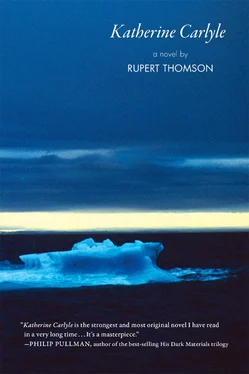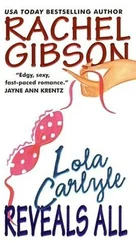Klaus returns with two glasses of champagne and a program.
“Quite a crowd,” he says.
“Tchaikovsky’s Pathétique .” Horst twists his lips. “Always popular.”
Klaus looks wounded.
“You’re here too,” I say to Horst.
“I have a complimentary ticket,” he says. “I do not pay.”
Soon afterwards he moves away. He approaches a woman in a small close-fitting hat of orange feathers and begins an animated whispered conversation, his mouth only inches from her ear.
“How do you know him?” I ask Klaus.
“We were at school together. I don’t see him often.” Klaus finishes his drink. “He runs a gallery.”
I’m still watching Horst. He notices, and allows himself a quick sardonic smile.
/
Once we are in our seats I consult the program notes. Written shortly after the Second World War, Prokofiev’s Sixth Symphony addresses dark themes of loss and damage — “wounds that can’t be healed.” As I lift my head, the conductor raises his arms, and the audience goes still. Loud blasts burst from the brass section, then the strings come in, giddy, out of kilter, somewhat unhinged. I feel as if I missed the beginning but I know I didn’t. The turbulence dies down, and the music becomes melancholic, questing. A gradual awakening, a sense of possibility. Then more bombardment from the horns and trumpets. It’s like trying to listen to several people talking at once, but maybe that’s the whole idea. The lack of a single lucid voice, the absence of a solution. Wounds that can’t be healed .
I glance at Klaus, who sits upright with his hands flat on his thighs and his eyes fixed on the orchestra. My mind drifts. I find myself thinking about The Passenger . There is a scene where Jack Nicholson’s wife tracks him down to a small Spanish town and he makes a getaway in a white convertible with his new lover, Maria Schneider. Filmed from behind, the convertible speeds into a tunnel while the car carrying the camera pulls over and stops. For a few daring, hypnotic seconds of screen time Antonioni allows the main action of the film to disappear from the film itself. I’ve never known exactly what to make of his decision. I used to think he was drawing attention to Nicholson’s predicament: in taking on a new identity, a stranger’s identity, Nicholson has shrugged off his old life, left it all behind. Now though, with my own thoughts wandering, I see the scene from another angle. What if Antonioni’s parking of the camera is mischievous, or mocking? The Passenger is a difficult film, and he might be playing with his viewers, predicting or preempting a lack of concentration. He’s looking away before they do … Just then, the Prokofiev becomes unexpectedly tuneful, almost sweet. Is it me, or does the symphony seem to have turned into a movie soundtrack? Klaus has not reacted. He remains transfixed, lips slightly parted, as if in awe.
Returning to The Passenger , I once again see Nicholson and Schneider disappear into the dark mouth of the tunnel. I see the road’s cracked surface, the dusty verge, the weeds. Of course it’s always possible that Antonioni is conjuring a sense of apprehension. He can’t bring himself to follow his characters. He’s fearful of witnessing what’s going to happen. He doesn’t want to know … Or perhaps it’s about validity. Perspective. That ordinary stretch of Spanish highway has just as much significance as anything else. Next to the tunnel is a sign that says GRACIAS POR SU VISITA. It’s ironic. Or naive —
The curtain falls suddenly, to rapturous applause.
“The interval,” Klaus says.
People rise from their seats. Some have been soothed by the music in a cryptic, almost celestial way. They look benign, incapable of cruelty or violence. Others seem thoughtful, as if they have been set a puzzle or conundrum. And there are those who have a narcissistic air that reminds me of the English couple in the cinema. They have achieved importance simply by attending.
Back in the bar I notice Horst Breitner in the crowd. His eyes rest on me, moist and slightly sticky, then slide away again. Klaus returns with two glasses of white wine. His forehead gleams, as if listening to music is a form of physical exertion.
“Are you enjoying it?” he says.
“Very much,” I say. “But I think I’ve had enough for now.”
“You don’t want to hear the Tchaikovsky?”
“This is a new experience. I’m a bit overwhelmed.”
He stares miserably down into his glass. “Would you like me to take you home?”
“No, no. You go back in. I’ll wait for you.”
“But there’s another hour —”
“That’s fine. I’ll wait.”
When people surge back into the auditorium Klaus is carried along with them. At the doorway he looks over his shoulder. I wave at him. I wonder if he thinks I’m saying goodbye — that I’ll be gone when he comes out, and that he’ll never see me again. It’s not my intention. These days, though, when I leave a room, I often have the sense that I might not return. Steps can’t always be retraced; the path through the forest closes behind me as though it was never there. The repetition that used to characterize my life has gone and I’m left with a trajectory that feels driven, linear. No day is like another day, no moment like the next.
I buy another drink and sit at a table in the corner. Opening my notebook, I begin to describe my move to the apartment on Walter-Benjamin-Platz, and how I have become separated from what might commonly be perceived as the main action of my life. How I have cut loose. How I’m operating with a kind of freedom I never imagined. Sometimes, as I write, I’m aware of the Tchaikovsky, swelling and fading beyond the closed doors, but mostly it’s blotted out by the chatter of the bar staff and the clink of glasses. I glance down at the page. My handwriting looks unfamiliar to me.
I finish my wine and go outside. Wrapping my coat around me, I sit on the top step and look out over the Gendarmenmarkt. Floodlit churches on either side, the low cloud cover glowing orange. I’m about to open my notebook again when a man approaches. He starts up the steps, but stops when he sees me.
“How are you doing?” His voice has grit and gravel in it. His accent is American.
“Fine,” I say. “You?”
He stands three steps below me, hands in his trouser pockets. The traffic on the east side of the square is on a level with his face. Cars seem to go in one ear and out the other.
“What’s so funny?” he says.
I shake my head. “Nothing.” He’s wearing a gray plastic raincoat and a pair of tennis shoes. One of the laces is undone. “You’re not going to ask me for money, are you?”
“Money?” He looks south, towards the cathedral. “I’ve got more money than I know what to do with.” He takes out a twenty-euro note, holds it between finger and thumb, and sets fire to one corner with a lighter. His thumb and finger open. The burning banknote floats away into the darkness like a vivid ragged moth.
“Beautiful,” I say.
He laughs. It wasn’t the reaction he was expecting.
“Don’t you like Tchaikovsky?” he says.
“Maybe. I don’t know. One symphony’s enough.”
He nods, then gazes up into the sky. I close my notebook but leave it resting on my knees.
“What were you writing?” he asks.
“None of your business.” To anyone else this would be rude. With this man, though, it seems natural, appropriate.
“You were recording your impressions of the city,” he says. “Or your dreams. You always dream when you go somewhere new.”
“You don’t look rich,” I say.
He laughs again, then looks at me askance, across one cheek. “You know what they say about appearances.”
Читать дальше












